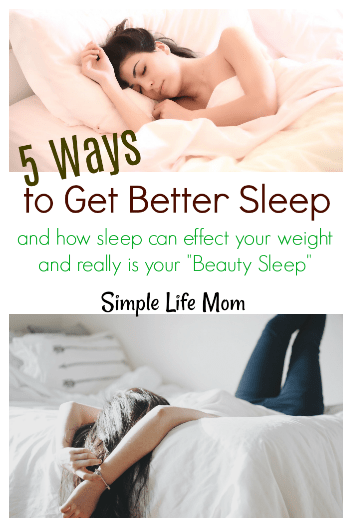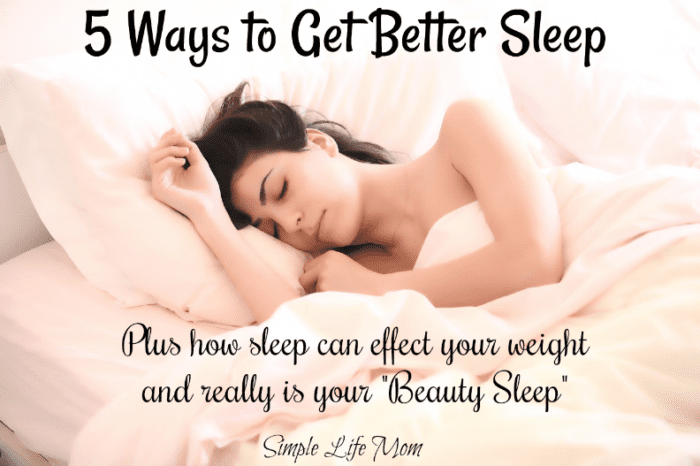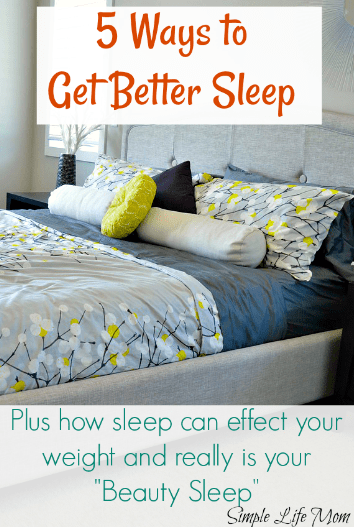Most of us know that sleep is important. We’ve read articles, been told varying facts, or just know how crummy we feel when we get less sleep than usual. Sometimes, even when we know we need to get better sleep, we don’t do what’s needed to make sure we get it. Are we just not convicted? Is our motivation not enough? Or does nothing work, no matter what you try?
I want to give you, first, some extra motivation. But then I also want to give you some easy tools to hopefully take you off the path of spiraling bad habits or hopelessness and living with the miserable status quo. Even if you think you have the best memory foam mattress and your sleep is ‘okay’, I would still recommend you to have a read!

My hope is that these ideas and tools will inspire you to find what works for your body type and situation so that you can start living, feeling, and even looking better each day.
The Importance of Sleep (some interesting facts)
First, let me say that in this area I am a complete hypocrite. I know how much better I feel after better sleep, but I also am guilty of piling up the stress and then reading through half the night either because it’s the only time I get to do what I want to do, or because I need that time to de-stress and try to calm down so that I can sleep.
I know I have bad habits, but it’s so much easier holding on to the cycle that I’m in, rather than making the changes I need. The story of our lives, right? The harder path is often the path that lead to higher reward.
So I challenge you today, as I challenge myself. We have a new year coming up here. What better time to start re-thinking our habits and starting new and better ones?
Fact #1 – You get a lot less DEEP sleep after midnight.
Deep sleep helps you feel energized and wide awake during the day. Get only a little deep sleep and you’ll feel sleepy in the middle of the day instead of at bed time.
Deep sleep is also when cell repair happens. If you have worked out and have sore muscles, this is when muscles repair and build. This is when your skin has a chance to repair, so it really is your “beauty sleep”
Lastly, deep sleep improves memory by completing processes and helping with long term storage of facts.
Deep sleep is so important, yet studies show that it occurs within the second cycle and for some reason the later you fall asleep you don’t get it back (even if you sleep in). So if you fall asleep at 1am and sleep until 9am you think you must be doing ok because you got 8 hours of sleep, but in reality you will probably have only an hour of deep sleep if you’re lucky.
Exhaustion and stress, light from the morning, sounds, etc. all play a large roll in attaining deep sleep.
Fact #2 – Sleeping Less and Weight Gain are Connected
“Research by Dr. Van Cauter shows that people who don’t get enough sleep are more likely to have bigger appetites due to the fact that their leptin levels (leptin is an appetite regulating hormone) fall, promoting appetite increase.”
The Natural Sleep Foundation states that “the psychological manifestations of fatigue, sleep and hunger are similar. Thus, when you’re feeling sleepy you might feel like you need to head for the fridge instead of bed.”
Another great motivation to set and stick to a regular sleep schedule.

5 Ways to Improve Sleep
I’ve just given you 3 huge reasons to get more or better sleep:
- Beauty and Youthful Skin
- More Energy
- Weight Control
There are so many more, such as controlling reflux, and other gastointestinal issues, as well as decreasing heart disease!
There’s your motivation. But what if you want to sleep better, but it just doesn’t happen? Here are a few ideas that may set you on the right track.
1) Set a Realistic Bedtime and Be Consistent
You’ve probably heard people mention your body clock. We really can train our bodies to go to sleep or even become sleepy at the same time each night. Different things will disrupt this, like excitement from an event or party, meals, alcohol or caffeine. But in general, a consistent sleep time makes a big difference in being able to fall asleep quickly.
Once you decide on the perfect time to go to sleep, think about what keeps you from keeping it. Teenagers? Baby? Spouse? Work Schedule? Brainstorm how you can make changes. Have a family meeting and tell them about your goals and ask for ideas. We did this recently and it really helped. My 14 year old even told me that he likes to get up earlier and would rather go to sleep at an earlier time. I can remind my kids about our goals and they grumble a lot less about being sent to their rooms so that they can relax and read before falling asleep (They need a tune down, no electronics time before sleeping too).
If you have young children and need time to relax after they are in bed, consider creating an entire schedule for them that gets them in bed an hour before your bedtime. Just like you may do for yourself, consider a bath time, cuddling, and reading before bed and be consistent. They will start to fall asleep on a better schedule, and then you can focus on doing the same thing for yourself.
2) De-Stress!
I’m currently taking the Herbal Self-Care for Stress Management Course from The Herbal Academy. It’s the 3rd course I’ve taken from them and it is packed with stress management information (They’re having a sale this month too!). I’d love for you to join me in an effort to learn more about stress management for yourself, as well as for those you love. Getting to sleep when you are stressed can cause a lot of problems for you. It makes everything a lot harder to do.
Stress causes a chain reaction of events within glands in your body. Perpetual stress creates an environment of Fight or Flight that doesn’t just last for 5 minutes, but instead lasts for days, if not weeks. Chronic stress can increase depression, reduce immune response, increase sugar in the blood stream which can increase cancer risk, decrease hair growth, and finally, chronic stress can disrupt the body’s ability to achieve deep sleep.
This means, no beauty sleep (cell repair), lower energy levels, and possible weight issues.
The importance of stopping chronic stress really is life or death. You have to make changes! While our bodies can handle varying daily stressors, chronic stress can have long term effects.
- Pray
- Meditate on what is causing stress and reach out for help on how to make changes.
- Try aromatherapy.
- Listen to music that makes you happy.
- Laugh. Break the cycle by taking breaks and making yourself laugh.
3) Create the Right Sleep Environment
Studies will tell you to make your bed a place for sleep. Don’t lay on your bed to read, eat, or watch TV. Instead, our bodies respond strongly to consistency. Think of how people can salivate when just remembering their favorite dish, or how a song or smell brings back a strong memory. Your bed should be a place that triggers sleep.
Studies show that your room should be extremely dark, quiet, and cool. People who are hot or extremely cold will not sleep well, but studies show that it’s better to sleep comfortably cool.
This also means: no TV, night lights, pets, and other disturbances. Make some changes and make sure your environment is supporting your efforts.
4) Consider Using Herbs or Essential Oils
There are a number of tried and true herbs and essential oils that help calm the body, help hormones regulate, and get the body ready for sleep. You do NOT have to be a crunchy hippy to try these methods. Your mainstream doctor will tell you they are wise methods.
My top sleep improving essential oil is vetiver.
Though I’ve read a lot about vetiver essential oil, I have a first hand testimony about it’s effectiveness. My mom and dad diffuse it in their bedroom before sleep and claim that it has drastically improved their ability to fall asleep and sleep more soundly. My mom said that she recently ran out of it and witnessed a big difference. It has a hormone triggering effect for calming the body and reducing cortisol (the stress hormone), helping your body become more balanced and able to receive those signals for sleep.
Stress relieving Herbs are numerous and can be used most easily as a tea. I’ve written a lot about them HERE. You can choose your favorite variety and incorporate them into your evening routine. These will also help your body to relax and signal that sleep time is coming.
5) Watch What you Eat and When
I tend to eat very little during the day, consuming most of my calories for the day after 5-6pm. This is when some people recommend that you wind down your eating, not step it up. I definitely need to change my eating pattern.
Obviously, it’s hard to sleep when you are genuinely hungry. Yet, as stated above, sometimes fatigue can urge us to eat, even though we’re tired, not hungry. So, is that hunger you’re feeling at night really hunger, or is it your body calling out for sleep?
A big meal right before bed can also disrupt sleep by causing reflux, indigestion, or other sleep disrupting issues. Instead, try drinking a glass of water before bed. If you still feel hungry, try a light snack like a cheese stick, carrot stick, a cucumber, or a banana. Bananas are high in potassium, which has been reported to increase your ability to produce melatonin (which will help you to fall asleep).
Other foods like Tart cherry juice, kiwi, and other foods that are high in fiber and protein will reduce blood sugar levels and decrease inflammation (and often joint pain) and will help you sleep better. Just keep it light and don’t over do it the last 2-4 hours before bed.








2 Comments
Leave your reply.